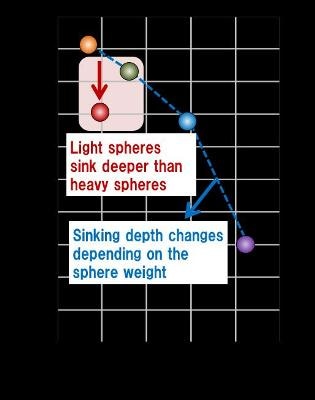May 4 2016
A group of researchers at Okayama University and Osaka University, Japan examined the state of the surface of apparently fixed powder beds in which air weak enough not to move the powder is injected, and observed anomalous sinking phenomena, a world first.
 This is a picture of sphere density and sinking depth. Credit: Okayama University, Osaka University, University of Melbourne and Swinburne University of Technology
This is a picture of sphere density and sinking depth. Credit: Okayama University, Osaka University, University of Melbourne and Swinburne University of Technology
The following anomalous sinking phenomena were found by Jun Oshitani, Associate Professor, Graduate School of Natural Science and Technology, Okayama University,Takuya Tsuji, Associate Professor, Graduate School of Engineering, Osaka University and Derek Chan, Professor, School of Mathematics and Statistics, University of Melbourne and Department of Chemistry and Biotechnology, Swinburne University of Technology, Australia.
1. Unlike the case of fixed powder beds without air injection, anomalous sinking of spheres due to local fluidization of powder beds was observed.
2. The final sunken depth of a sphere varied with the sphere density and air strength.
3. When the sphere density is close to the powder bed density, spheres with smaller densities sank deeper than ones with bigger densities.
Sinking of objects in fluidization, in which powder is fluidized due to air injection, is used as a dry-type gravity separation technology for recycling of wastes; segregating waste plastics and non-ferrous metals. However, with this technology, only two kinds of objects with different densities, floating objects and sinking objects, can be separated at one time.
If this unique sinking phenomenon discovered by this group is used, a dry-type gravity separation technology for separating three objects with different densities can be developed, increasing the efficiency of recycling wastes.
This research was published in Physical Review Letters on Thursday, Feb. 11, 2016.